Iranian, American and Serbian families enjoyed the benefits of favoritism towards ones own family and friends in times of need. Nepotism continues to be the social glue that has helped us survive through the tough times. In the last depression in the 1930’s, it was not the goverment intervention that made the individual survive through economical crisis, but support from ones social community.
During the Iran-Iraq war, the family unit was where folks seeked shelter from the economic punishment sanctions of the West. In my family for example, it was important for my aunts and uncles to provide support, so that you can survive the government’s measly coupons at rations. The extra ration of sugar and rice that we received because two of my brothers had been abroad was helpful, and we could share with the less fortunate family next door.
Relationship built with your neighbor and family provides a sense of economic and mental security that no government can provide, while trying to defend the country from Iraq and its allies, the western governments. It was during these hard times that family, friends and neighbors are forced to share the very little that they have for mutual survival.
I always remember my cousin being sent down by my aunt, asking for things like butter or rice, and since he was five years younger then me, my brother and I would give him onions as a practical joke and tease him with his request for other items. Now that he is in his late 20’s he hates onions. You’re welcome cousin!
“Relationship built with your neighbor and family provides a sense of economic and mental security that no government can provide”
Other times when we could not purchase American cigarettes at the stores, it was through the neighbor or the cousin that we would find out who is selling cheap foreign cigarettes. We would get our information as to what the local grocers are offering. When the local grocer was out of butter, it was our neighbor that offered a helping hand so we could meet our sustenance. You would know by your neighbor’s son as to the location of the store, the length of time that it would take to wait in line, and the quantity that you would receive based on rations. You would then go to the store knowing that you can spend all day in line waiting to get that ration of rice or meat. In order to save time, we would look for a familiar face of a neighbor or friend that we would make chit chat with, and then be able to cut in line to avoid the long lines while being cursed by folks at the end of the line.

